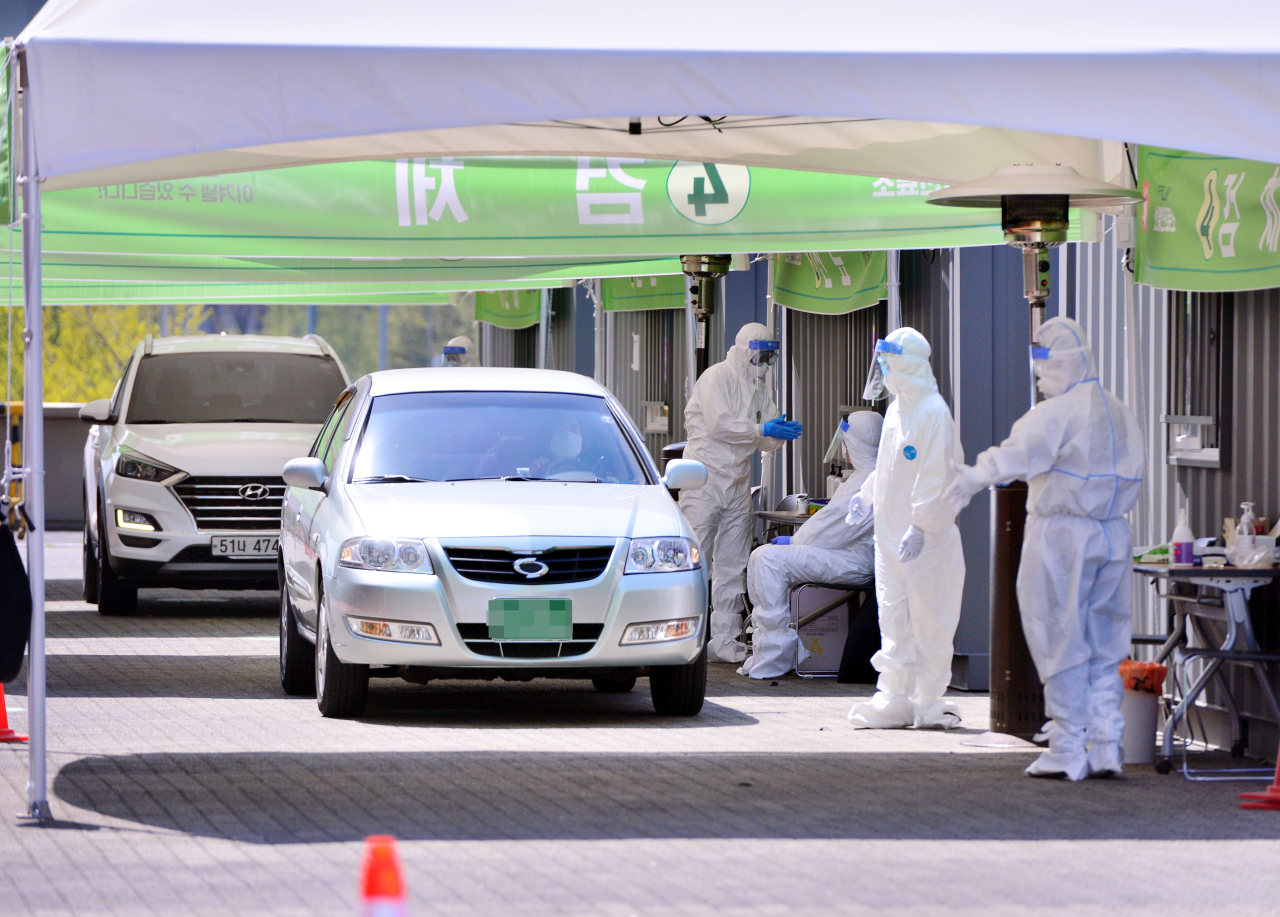Loose social distancing looms large as new virus cases stay low
By YonhapPublished : April 27, 2020 - 10:29

In a sign of the containment of the new coronavirus, South Korea reported just 10 new cases Monday, but health authorities remain vigilant over the upcoming holidays, which could potentially lead to cluster infections.
It marked the fifth day in a row that the number of new infections stayed at 10 or below, bringing the nation's total infections to 10,738, according to the Korea Centers for Disease Control and Prevention (KCDC).
Of the newly added cases, seven were imported, raising the country's total number of such cases to 1,044. Of the imported cases, more than 90 percent were South Korean nationals.
South Korea said while the number of arrivals from foreign countries has decreased sharply recently to hover around 3,000 per day, it plans to maintain thorough quarantine measures amid the rising number of imported cases.
The nation's virus death toll from COVID-19 rose by one to 243.
The overall fatality rate reached 2.26 percent. The figure, however, reached 23.9 percent for patients in their 80s and above.
In total, 8,764 people in South Korea have recovered from the virus, up 47 from a day earlier, indicating more than 80 percent of the COVID-19 patients reported here have been cured.
The country said it will carry out disinfection operations at hospitals or facilities regularly every two weeks to prevent another cluster infection.
Around 80 percent of COVID-19 cases reported here are categorized as cluster infections.
KCDC Director-General Jeong Eun-kyeong said the new coronavirus disease is not considered a chronic illness, such as hepatitis C or AIDS, at the current stage, although more studies need to be carried out on patients recovering from the virus.
South Korea believes it has avoided the worst scenario due to its social distancing drive despite being one of the first countries hit hard by the virus that originated in China.
The drive is still in force until May 5, but the country is likely to move toward "everyday life quarantine" after the date, which means schools and workplaces will mostly return to their normal routines.
Even if the lax social distancing drive is implemented, South Korea said it will still apply strict policies for schools.
The country plans to announce its new guidelines for schools by early May, with options including starting official semesters for middle and high school seniors or having students come to school at different times.
Despite a respite, local health authorities remain alert ahead of the upcoming holidays, when people are expected to make short trips locally, as air travel overseas is virtually suspended.
"We need to be aware that one patient can lead to a major cluster infection," Vice Minister Kim Gang-lip said, urging South Koreans to refrain from traveling around the country during the holiday.
South Korea will celebrate Buddha's Birthday on Thursday, followed by May Day on Friday and Children's Day on May 5.
The number of new infections continued to slow in Daegu, the nation's worst virus-hit region that accounts for around 64 percent of the total cases, with just one additional case.
North Gyeongsang Province, which surrounds Daegu, reported no new COVID-19 infections, along with Seoul, the capital city.
Two cases were reported from Gyeonggi Province that surrounds Seoul.
South Korea, whose population is estimated at around 50 million, has carried out 601,660 tests for COVID-19 since Jan. 3.
Health authorities are also keeping watchful eyes on relapse cases as well. As of Monday, the number of patients who were tested positive again after being discharged from quarantine came to 268.
"Despite the falling number of patients, we are still far from being able to feel relieved. The COVID-19 pandemic is still persisting," Jeong said. "This week will be crucial in deciding whether or not we can move on to the everyday life quarantine."
Jeong added that South Koreans should be aware that some COVID-19 patients are showing no symptoms.
"A significant number of COVID-19 patents do not show symptoms, although more studies need to be done to estimate their portion," Jeong said. "It is believed, however, that those without symptoms tend to be less contagious."
Starting Monday, South Korea will apply electronic wristbands equipped with a location-tracking system on people who violate self-isolation rules to better contain the spread of the novel coronavirus.
To avoid the rising controversies over human rights, health authorities said violators will be given two options -- either wearing the wristbands or being sent to state-designated quarantine facilities.
The country also eased its distribution scheme on the supply of protective masks to the public, allowing people to buy three masks per week, compared with the previous two.
Jeong added that South Korea is currently reviewing legal grounds to guarantee sick-leaves for workers with COVID-19 symptoms. (Yonhap)












![[Weekender] How DDP emerged as an icon of Seoul](http://res.heraldm.com/phpwas/restmb_idxmake.php?idx=644&simg=/content/image/2024/04/25/20240425050915_0.jpg&u=)







